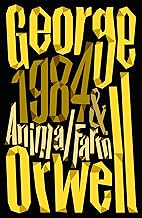
Review: Animal Farm and 1984 – The Dangers of Totalitarianism and the Fight for Freedom
Introduction
George Orwell, one of the most prominent political writers of the 20th century, is best known for his two iconic works, Animal Farm and 1984 (also known as Nineteen Eighty-Four). Both novels stand as stark warnings against the rise of totalitarian regimes, the manipulation of truth, and the erosion of individual freedoms. While Animal Farm is a satirical fable, 1984 presents a dystopian reality, both works delve into the theme of power’s corrupting influence and the fragility of human liberty.
Animal Farm – A Satirical Allegory
Animal Farm (1945) is a political allegory that uses farm animals to represent the events leading up to the Russian Revolution and the rise of Soviet Communism. The story begins with the animals overthrowing their oppressive human owner, Mr. Jones, in the hopes of establishing a society where all animals are equal. However, as the pigs, particularly Napoleon, gain power, they begin to mirror the tyranny they once sought to overthrow.
The novel is a clear critique of how political ideologies, especially Marxism, can become corrupted once in power. Orwell uses the animals' gradual realization of their enslavement under the pigs to symbolize how totalitarian leaders manipulate the masses and rewrite history to serve their own agendas. The famous line "All animals are equal, but some animals are more equal than others" epitomizes this hypocrisy and how language can be used as a tool of control.
The strength of Animal Farm lies in its simplicity. The story, while seemingly straightforward and aimed at younger audiences, provides sharp commentary on the nature of power and political betrayal. Orwell masterfully highlights how idealism can be perverted when individuals, despite claiming equality and justice, fall victim to their own ambition.
1984 – A Dystopian Reality
Published in 1949, 1984 takes Orwell’s critique of totalitarianism to a more severe, terrifying level. Set in Oceania, one of three totalitarian superpowers, the novel follows Winston Smith, a low-ranking Party member who secretly rebels against the oppressive government led by Big Brother. In Oceania, everything is controlled by the Party—thought, language, history, and even love. The government’s surveillance apparatus, personified by the Thought Police, ensures that dissent is swiftly and brutally crushed.
Unlike Animal Farm, where the pigs slowly rise to power, 1984 presents an already fully realized totalitarian state. Orwell envisions a world where independent thought is illegal, and where truth is constantly altered to fit the Party’s narrative. The slogan “War is Peace, Freedom is Slavery, Ignorance is Strength” encapsulates the Party’s ability to control reality itself. The idea of “doublethink”—holding two contradictory beliefs simultaneously—shows the terrifying extent to which the Party can manipulate its citizens' perception of truth.
Winston’s ultimate rebellion and his tragic fall from defiance to conformity serve as a chilling reminder of the extent to which totalitarianism can strip away personal agency. Orwell illustrates the dehumanizing effects of an all-powerful state, where even love and loyalty are sacrificed for the greater good of the regime. The novel’s bleak ending, where Winston is broken and comes to love Big Brother, is a powerful commentary on the crushing force of oppression.
Common Themes – Power, Corruption, and Control
Both Animal Farm and 1984 share a central theme: the corrupting influence of power. In Animal Farm, the pigs’ rise to power mirrors the betrayal of revolutionary ideals for personal gain, as they gradually adopt the same methods of oppression as the humans they overthrew. In 1984, power is not only about control but also about erasing the possibility of rebellion by controlling the very thoughts of individuals.
Language and propaganda are also central tools in both novels. In Animal Farm, the pigs use the commandment changes and slogans to manipulate the animals’ understanding of their reality. Similarly, 1984 presents Newspeak, a language designed to eliminate unorthodox thoughts by reducing the range of expressible ideas. In both cases, Orwell warns of the dangers of a society where language is twisted to serve the interests of the powerful.
The Relevance Today
Though both novels were written in the mid-20th century, their themes remain strikingly relevant in today’s world. The rise of surveillance technology, government propaganda, and political manipulation echoes the dystopian realities Orwell portrayed. Whether it's the manipulation of news, the rewriting of history, or the erosion of civil liberties, Animal Farm and 1984 continue to serve as dire warnings about the fragility of democratic freedoms and the capacity of totalitarian systems to thrive when unchecked.
Conclusion
Animal Farm and 1984 are masterpieces of political literature, each offering profound insights into the dangers of absolute power. Orwell's prescience in understanding the mechanisms of oppression, from propaganda to surveillance, allows these works to transcend their historical context and speak to contemporary issues. As such, both novels remain essential reading for anyone interested in the dynamics of power and the fight for individual freedom. Orwell’s bleak portrayal of humanity's susceptibility to tyranny is a lesson that continues to resonate with readers around the world.
This detailed analysis shows how both novels serve as powerful tools for reflection on political systems and the ongoing relevance of their warnings.
- Hits: 50